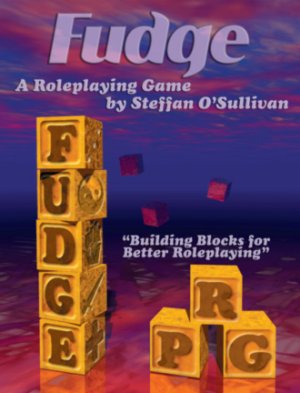I was talking to a friend of mine last week about the RPG systems we like and dislike. You see, he's a good friend, we played lots of boardgames together, but we never had a chance to roleplay even an one-shot session.
If you understand Portuguese, you'll be able to read his reasons about his TOP 10 picks. Just click here and have a good read. If not, at least the titles shouldn't be language dependent.
Here's mine. They are not in any particular order.
Savage Worlds
My system of choice nowadays. Fast and fun (furious depends on the setting), this generic system is a boon to all Referees (GMs, DMs, Narrators, YMMV) since it's easy to adjucate and it compels you to create fantastic adventures. During another RPG system game, where I let the Referee's mantle to a friend of mine (you know how rare is the chance to play?), I thought to myself: this could work better in Savage Worlds; that mechanic is clunky... Yes, I'm becoming a fan boy...
AD&D 2nd Edition
I simply loved the system. Unbalanced, geared toward a specific genre emulation, but I loved my 3 books. I've played lots and lots of campaigns in my teens and AD&D 2nd is a system dear to my heart.
GURPS - Generic Universal RolePlaying System
How many years of my life I spent playing GURPS? To many to tell. A 7-year campaign and another 5-year campaign may hint at that though. I needed to re-bind my Basic 2nd edition twice, as it was the book I used the most (to be clear: my Rules Cyclopedia is in better shape than my GURPS Basic). Point-buy was something I've never saw before when I was a pre-teen, and that seemed to open my mind to many more worlds... Also, all the source books were a labor of love, and kept me reading them over and over again.
Barbarians of Lemuria
Few game systems can emulate a genre better than this one. Simple and with an old-school feel, this game is perfect for a sword & sorcery adventure. 2d6 + modifiers solve all your dillemas, from hack and slash a foul sorcerer to sneak past the guards. As a plus, the quick character creation also gives you a quick background to work on.
Dragonlance 5th Age
Card-based RPG during an age of lesser railroady plots. The magic system could be abused, and fighting giant beings was really dangerous (or even impossible), but helped to set the tone of an Age of Mortals where the shades of gray seemed brighter than light and dark combined.
Fudge
Fudge is too dear to me. It was the game that allowed me to publish my first RPG back then. And that opened the doors to me: I was able to become a novelist. But I digress. Fudge is a marvelous toolkit, allowing virtually anything, but as a plug 'n play system some assembly is required. On the hands of a experienced Referee it's a blast -- on a novice's hands there'll be lots of trouble.
Epées et Sorcellerie
Basic D&D meets Chainmail and the offspring is one of the greatest indie games ever made. It's a shame there's not so much love for this, but I think French designers are better at creating their games than promoting them.
Microlite74
There was the OGL. There was Microlite20 (D&D 3rd in less than 20 pages). And there was Microlite74. While M20 focused on D&D3, M74 tried to cover Classic D&D. The result was incredible, as everything was rewritten in a concise way. Yet, I still dream of the day where Epées et Sorcellerie will receive a Microlite treatment and become a small game as well.
ICONS
Steve Kenson is one of the best Supers authors out there. ICONS takes Fudge, inject it with some radioactive material, and creates an astounding Supers RPG.
Storyteller / Storytelling / Whatever it's called nowadays
I can't deny the importance of Vampire/Werewolf during the "Great RPG Revival" in the 90s. Many people that never thought about playing RPGs were drawn to the games as a moth to the light, and in despite of the angst-ridden emo LARPers, the tabletop games were interesting. I remember fondly the X-Files campaign I've narrated at the time and I miss those times.
Kickstart Your Weekend: Horror and Sci-Fi!
-
A nice mix today. Let's get to it.
*Frightshow Classics*
[image: Frightshow Classics]
https://www.kickstarter.com/projects/frightshowclassics/frightshow...
15 hours ago









